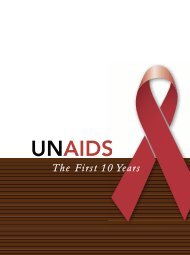Integration of HIV/AIDS activities with food and nutrition support in ...
Integration of HIV/AIDS activities with food and nutrition support in ...
Integration of HIV/AIDS activities with food and nutrition support in ...
Create successful ePaper yourself
Turn your PDF publications into a flip-book with our unique Google optimized e-Paper software.
E. Mathys Kirkcaldy<br />
Integrated Programme Strategy 17:<br />
Support for tra<strong>in</strong><strong>in</strong>g <strong>and</strong> other capacity-build<strong>in</strong>g <strong>activities</strong><br />
for formal <strong>and</strong> traditional health care providers<br />
Food <strong>and</strong> related resources can be considered a possible <strong>in</strong>put to <strong>support</strong> tra<strong>in</strong><strong>in</strong>g<br />
programmes for formal facility-based staff <strong>and</strong> traditional community health workers,<br />
to enable them to contribute effectively to <strong>HIV</strong>/<strong>AIDS</strong> prevention efforts. External <strong>food</strong><br />
<strong>in</strong>puts should be phased out when community <strong>support</strong> is susta<strong>in</strong>able, <strong>and</strong> provisions<br />
should be sought from the outset to achieve such susta<strong>in</strong>ability.<br />
What does this <strong>in</strong>tegrated programme strategy aim to achieve?<br />
Provision <strong>of</strong> <strong>food</strong> or related resources may enable <strong>and</strong> encourage health care providers to<br />
participate <strong>in</strong> tra<strong>in</strong><strong>in</strong>g <strong>activities</strong> designed to provide the knowledge <strong>and</strong> skills they need to<br />
contribute effectively to <strong>HIV</strong>/<strong>AIDS</strong> prevention efforts. Refugee health facilities employ staff<br />
from the refugee <strong>and</strong> host communities <strong>with</strong> vary<strong>in</strong>g skill levels. Traditional health care providers<br />
will have vary<strong>in</strong>g degrees <strong>of</strong> <strong>HIV</strong>-related knowledge. Short workshops can provide tra<strong>in</strong><strong>in</strong>g<br />
on specific issues, such as the use <strong>of</strong> gloves or the avoidance <strong>of</strong> high-risk cultural practices.<br />
Longer-term tra<strong>in</strong><strong>in</strong>g programmes are a greater <strong>in</strong>vestment <strong>in</strong> develop<strong>in</strong>g the skills <strong>of</strong> selected<br />
key personnel.<br />
How would this <strong>in</strong>tegrated programme strategy be implemented?<br />
Institutional collaboration <strong>and</strong> coord<strong>in</strong>ation. Refugees typically use a comb<strong>in</strong>ation <strong>of</strong> cl<strong>in</strong>icbased<br />
<strong>and</strong> traditional health services. Partnership between facility-based staff <strong>and</strong> traditional<br />
care providers is essential to ensure that all care providers m<strong>in</strong>imize the risk <strong>of</strong> <strong>HIV</strong> transmission<br />
<strong>in</strong> their own practice, <strong>and</strong> educate their clients on <strong>HIV</strong> prevention.<br />
Referral form used by Red Cross health staff <strong>and</strong> traditional healers, Mwange Cl<strong>in</strong>ic, Zambia<br />
85

















